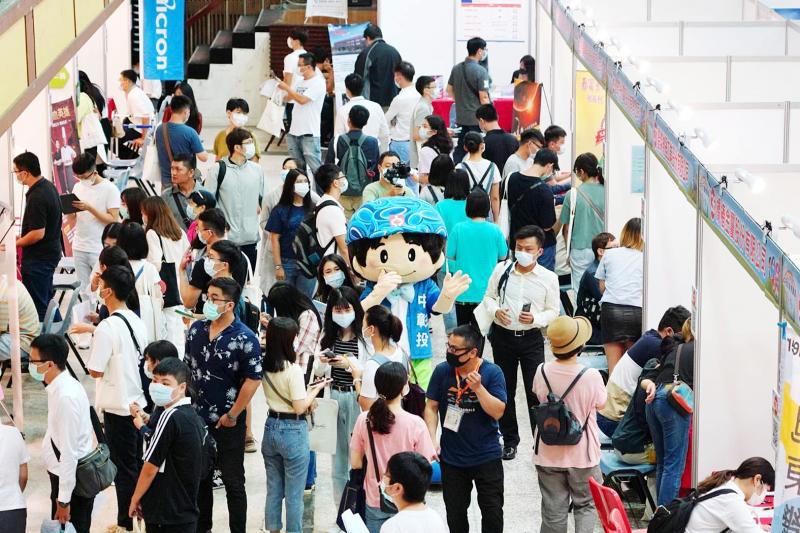Taiwan’s semiconductor industry has been aggressively recruiting talent this year, with its demand for workers in the second quarter rising more than 44 percent from a year earlier, Web site 104 Job Bank (104人力銀行) has said.
The industry is worth NT$3 trillion (US$107.9 billion).
In a white paper on the semiconductor industry’s workforce, 104 Job Bank said that Taiwan-based semiconductor companies averaged 27,701 job openings per month from April to June, the most in six-and-a-half years.

Photo: Tsai Shu-yuan, Taipei Times
That was an increase of 44.4 percent compared with the second quarter of last year and was the fourth consecutive quarter in which the figure rose.
104 Job Bank said that while the global economy has been hurt by COVID-19, Taiwan’s semiconductor industry has benefited from strong demand for emerging technologies, such as artificial intelligence, 5G applications and the Internet of Things, and continued to grow.
The booming stay-at-home economy, including the rising popularity of online learning and remote work, has also boosted demand for semiconductors, driving the need for more workers, 104 Job Bank said.
Within the semiconductor industry, the IC manufacturing sector saw the monthly average of its job openings in the second quarter grow 55.3 percent from a year earlier, it said.
This compares with 51.2 percent for the IC packaging and testing sector, and 40.8 percent for the IC design sector, it said.
IC engineers accounted for about 55 percent of the job openings advertised in the semiconductor industry per month on average, 104 Job Bank said.
Despite the growing demand, the average monthly wage in the semiconductor industry fell NT$195 (US$7), or 0.4 percent from a year earlier, to NT$52,483 in the second quarter, trailing the computer and consumer electronics industry’s NT$54,640, it said.
The IC design segment offered an average monthly wage of NT$67,834, compared with NT$56,190 in the IC manufacturing segment, and NT$47,014 in the IC packaging and testing segment.
The average pay, including bonuses, in the local semiconductor industry was NT$1.7 million, lower than the NT$2 million to NT$3.5 million seen in the US, Singapore and Japan, 104 Job Bank said.

UNCERTAINTY: Innolux activated a stringent supply chain management mechanism, as it did during the COVID-19 pandemic, to ensure optimal inventory levels for customers Flat-panel display makers AUO Corp (友達) and Innolux Corp (群創) yesterday said that about 12 to 20 percent of their display business is at risk of potential US tariffs and that they would relocate production or shipment destinations to mitigate the levies’ effects. US tariffs would have a direct impact of US$200 million on AUO’s revenue, company chairman Paul Peng (彭雙浪) told reporters on the sidelines of the Touch Taiwan trade show in Taipei yesterday. That would make up about 12 percent of the company’s overall revenue. To cope with the tariff uncertainty, AUO plans to allocate its production to manufacturing facilities in

Taiwan will prioritize the development of silicon photonics by taking advantage of its strength in the semiconductor industry to build another shield to protect the local economy, National Development Council (NDC) Minister Paul Liu (劉鏡清) said yesterday. Speaking at a meeting of the legislature’s Economics Committee, Liu said Taiwan already has the artificial intelligence (AI) industry as a shield, after the semiconductor industry, to safeguard the country, and is looking at new unique fields to build more economic shields. While Taiwan will further strengthen its existing shields, over the longer term, the country is determined to focus on such potential segments as

TAKING STOCK: A Taiwanese cookware firm in Vietnam urged customers to assess inventory or place orders early so shipments can reach the US while tariffs are paused Taiwanese businesses in Vietnam are exploring alternatives after the White House imposed a 46 percent import duty on Vietnamese goods, following US President Donald Trump’s announcement of “reciprocal” tariffs on the US’ trading partners. Lo Shih-liang (羅世良), chairman of Brico Industry Co (裕茂工業), a Taiwanese company that manufactures cast iron cookware and stove components in Vietnam, said that more than 40 percent of his business was tied to the US market, describing the constant US policy shifts as an emotional roller coaster. “I work during the day and stay up all night watching the news. I’ve been following US news until 3am

COLLABORATION: Given Taiwan’s key position in global supply chains, the US firm is discussing strategies with local partners and clients to deal with global uncertainties Advanced Micro Devices Inc (AMD) yesterday said it is meeting with local ecosystem partners, including Taiwan Semiconductor Manufacturing Co (TSMC, 台積電), to discuss strategies, including long-term manufacturing, to navigate uncertainties such as US tariffs, as Taiwan occupies an important position in global supply chains. AMD chief executive officer Lisa Su (蘇姿丰) told reporters that Taiwan is an important part of the chip designer’s ecosystem and she is discussing with partners and customers in Taiwan to forge strong collaborations on different areas during this critical period. AMD has just become the first artificial-intelligence (AI) server chip customer of TSMC to utilize its advanced